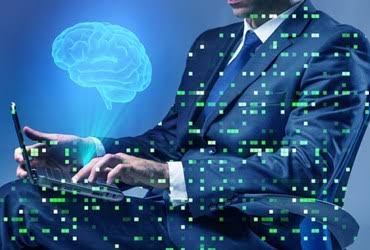In this article, Sakshi Goyal of Symbiosis Law School, Noida discusses the Emerging of Artificial Intelligence (AI) technology in the Legal sector.
Introduction
From Alexa, the virtual assistant to self-driving cars, Artificial intelligence is developing rapidly. The term Artificial Intelligence (AI) was coined by John McCarthy, an American computer scientist in 1956. According to Merriam Webster’s dictionary, “Artificial intelligence is a branch of computer science dealing with the simulation of intelligent behaviour in computers”. It is generally portrayed as robots with human intelligence.
Artificial intelligence has transformed every professional sector and the legal profession is no exception. Not only are the software solution replacing paperwork and data management, the legal industry is also becoming consumer-centric. Due to globalization, legal business has undergone continuous growth and technology advancement.
Except for the services which depend upon experience and judgement, everything else is open to being replaced by technology. As per Deloitte, “Over 100,000 jobs in the legal sector have a high chance of being automated in the next twenty years” No doubt that AI has received much attention but in the legal industry, it is still at an infant stage which makes it open for both great opportunities and severe challenges.
Uses of AI in Legal Profession
AI is scooping its ways into the legal profession and there are a number of software available in the markets which can replace the monotonous and tedious work done by the lawyers. AI helps the lawyers in the repetitive and routine jobs which indeed saves their time and further help them focus on important aspects.
Legal Research
A legal practitioner spends a lot of time doing legal research. It takes years for new lawyers to learn how to do legal research, how to find the correct legal authority which could help them support their argument. For doing the research almost all the legal firms appoints paralegals. Accurate research plays a very crucial role in winning the case. Development of AI software is an aid to the lawyers in this specific area. There are several software available in the market which help the lawyer to find relevant case laws and applicable statutes. With this software, complex legal questions can be answered in simple and basic language which is easy to understand.
Click here
Due Diligence
The lawyers are supposed to do a primary task of confirming the facts and situations on behalf of clients. It is on the basis of this information that they tell the clients as to what they are supposed to do or how they can proceed further with the case.
Due diligence is an exhausting and time-consuming procedure which definitely yields a positive result in the long run. On the other hand AI system helps to do the same task but in more sorted and faster way. AI makes thorough checks of the facts and the figures, evaluates the prior decisions given in the similar situation, which helps in providing effective counselling to the clients.
Prediction technology
Whenever a client approaches the legal counsel for any dispute the first question asked by him is “Should I settle?” or “What are the chances of winning if he goes for trial?”
AI technology has the capability to help the counsel in answering such questions. It can forecast the result based on algorithms. It evaluates prior decisions given by the ruling judge in similar cases. Not only this, many software also go through the documents attached in the case file, identify the high-risk documents and display the level of risk if the client chooses to undergo a trial. Group of professors and researchers have often tested the accuracy level of such software.
Recently Prof. Daniel Katz of Michigan State University and his group in 2017 achieved an outcome of 70.29% accuracy. A similar study was conducted by Nikolaos Alteras, where he reported Accuracy level of 79% in outcome prediction while analysing the cases from the European Courts.
Legal analytics
Case documents and dock entries are very important for any counsel so as to gain an insight during litigation. Analysing and reviewing all the documents in any file is also a time-consuming process. AI software improves the efficiency of lawyers while they are reviewing the documents by putting them in a required order. AI software flags the documents that are of high-risk or are relevant. Machines are efficient and faster than humans in sorting and reviewing the documents which helps the lawyer to save time and let him focus on the high-risk documents.
AI software not only help in the reviewing the case files but also the contracts which companies signs. Law firms are mostly involved in reviewing the contracts which their clients sign. They identify the risks or issues involved with the contract and then edit those clauses as per the needs of the clients. AI software helps identify the risky clauses and helps the clients by providing good negotiation points.
Contract generation
Nowadays many companies takes help from AI based software in drafting standard and routine legal contracts. AI software helps in generating basic templates which can be later customised as per the needs and requirements of clients.
Patent application
Most of the time IP lawyers are engaged in analysing large IP portfolios and trying to draw an insight from the available content. Filing a patent application is a long and tedious job. The process involves going through hundreds of documents and doing manual research. But with AI software all this is done at a faster pace. AI helps in formatting, drafting and reviewing patent applications.
Legal issues associated with AI
AI still being at an emergent stage has several legal issues which are developing all over the world. AI software uses large data to generate a significant amount of information. The data laws are also evolving all over the world. Last year US saw several legal issues between the US government and the technology companies and with the passage of time and development of AI software these issues are likely to grow. Recently in a murder case, Amazon Inc. has faced search warrants to provide data relating to its AI powered Echo device.
Moreover, there are no AI related laws or standards which can be relied upon and the only regulation provided is under data regulation laws and the data privacy laws.
Impact of AI on Indian Legal Industry
Indian Legal industry has not been much open to the technological changes. The principles on which the industry is based are the main reason for its resistance towards the technological development. The technological changes are expensive and inaccessible. Indian Legal system has always been labour intensive.
Many people in this country are not aware of the artificial intelligence which is tailored specifically for the legal work. In 2017, Cyril Amarchand Mangaldas, was the first Legal firm to sign an agreement with Kira Systems, a Canada-based machine learning software provider, to improve the efficiency, accuracy and speed of the firm’s delivery model for legal services. for legal research.
With the spread of Digital India, the Supreme Court has for the first time digitized its record which indeed has resulted into an adoption of AI technology by more law firms as AI uses the online information available.
Click here
Conclusion
The technological development in the legal sector has changed the framework in which it operates. It is difficult to consider the future of legal industry without thinking about the AI software which are evolving in markets. Now the legal business is becoming consumer-centric. Legal information is just a click away. Legal research is done through online software. Lawyers and firms are taking help of these software to draft and review the contracts as well as the case documents.
AI has benefited the lawyers and small law firms the most by providing them with the information and resources and bringing them at par with well-established law firms in terms of resource. Legal research is the most important aspect of practising law and because of technology, it has undergone a series of development. From journals and reporters to CD-ROMS and Online software, legal technological innovation has changed the way how legal services were rendered.
The technology advancement is to help the lawyers and users to do the task efficiently and quickly, but this does not mean that technology is going to replace the lawyers or their judgement or instinct.
References
- A general approach for predicting the behavior of the Supreme Court of the United States by Daniel Martin Katz, (April 12, 2017), Accessed at http://journals.plos.org/plosone/article?id=10.1371/journal.pone.0174698
- CAM pioneers use of AI for legal services in India by Raj Gunashekher, (February 6, 2017), Accessed at https://www.legalbusinessonline.com/news/cam-pioneers-use-ai-legal-services-india/73908
- Steve Lohr, A.I. Is Doing Legal Work. But it Won’t Replace Lawyers, Yet, N.Y. Times, (March 19, 2017), https://www.nytimes.com/2017/03/19/technology/lawyers-artificial-intelligence.html?_r=0
 Serato DJ Crack 2025Serato DJ PRO Crack
Serato DJ Crack 2025Serato DJ PRO Crack











 Allow notifications
Allow notifications


